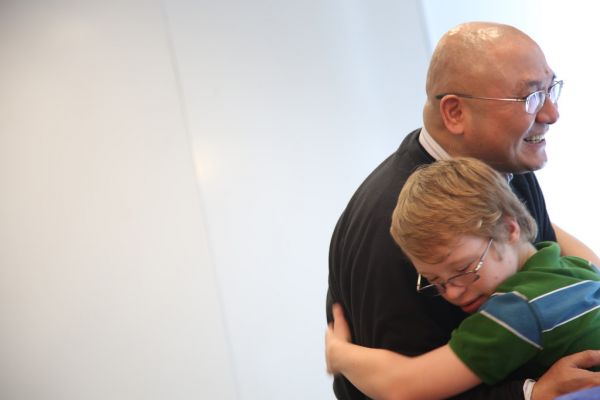While most cancers occur sporadically, and are caused by gene changes that happen during your lifetime, approximately 5 to 10% of all cancers are due to an inherited genetic change, called a mutation, to specific genes. These mutations can be passed from parents to children, generation after generation, and result in a higher risk for developing certain types of cancers.
Genetic testing can help determine whether or not you carry a mutation in one of the genes associated with cancer.
Am I at risk?
You may suspect a hereditary cancer risk if your personal or family medical history includes one or more of the following:
- Family members with multiple primary cancers, two or more new cancers (not one that has spread) such as both breast cancer and ovarian cancer.
- Two or more relatives with the same cancer type on the same side of the family.
- Ashkenazi Jewish ancestry may increase risk for having hereditary breast and ovarian cancer syndrome, caused by BRCA1 and BRCA2 gene mutations.
- Cancer diagnosed before age 50.
- Rare cancer diagnosis, such as male breast cancer or a sarcoma.
- Certain pathological findings for some cancers, such as triple negative (ER/PR/Her-2 negative) breast cancer, prostate cancer with a Gleason score of seven or higher or medullary thyroid cancer.
- Any ovarian or pancreatic cancer diagnosis.
- Metastatic breast or prostate cancers.
- A known mutation in a gene related to cancer risk, for example BRCA1/2.
Why would I want genetic testing?
Genetic testing looks at our genes to see if a mutation can be identified. If you have cancer, genetic testing may identify a likely cause of why you developed cancer and it may guide your treatment decisions toward specific medications. Genetic testing also helps identify potential future risk for other cancers or health conditions, so that screening and medical care can be directed accordingly. If a gene mutation is found, your family members may chose to undergo genetic testing to learn if they have an increased cancer risk, too. This would provide the opportunity to modify their medical management with specialized screening tests, to start screenings at a younger age, or to consider medication or surgery to lower their risk. Having a gene mutation does not mean that you will ever have cancer, but it tells your doctors that you are at higher risk.
Never miss another Cancer Talk blog!
Sign up to receive our monthly Cancer Talk e-newsletter.
Sign up!The testing process
First, you will meet with a genetic counselor who will explain the purpose of genetic testing and determine which type of test is right for you. Then you will provide a blood sample to be analyzed. Afterwards, your genetic counselor will review your test results and inform you and your doctors about the best medical management for you and your family. If you face a higher risk your doctor may follow your health more closely or you may be eligible (and have insurance coverage for ) more in-depth cancer screenings.
Can anyone have genetic testing?
Genetic testing is not recommended for everyone. Generally, it is limited to individuals and families with certain cancer types or who meet other specific criteria. The best person in a family to initially pursue genetic testing is someone who has previously been diagnosed with cancer. Genetic testing for cancer is very complicated and raises many questions. Many factors need to be considered by the doctor, the genetic specialist and the person interested in testing. Therefore, genetic consultation and risk assessment are recommended first.
What does it cost? Is it covered by health insurance?
The cost of genetic counseling depends upon the extent and complexity of the consultation. Initial and comprehensive genetic consults range from about $250 to $450. Most insurance plans cover this cost, but you should contact your insurance company to learn exatly what is covered.
Genetic testing is a separate charge from the genetic consultation. The cost of genetic testing varies but is often covered by health insurance if an individual meets specific criteria. If you are identified as a candidate for genetic testing, the laboratory performing the testing can assist your health care provider with insurance authorization prior to the genetic testing.
Privacy and discrimination concerns
If you do have genetic testing and discover that you have a gene mutation associated with a health or cancer risk, New York State and Federal laws protect most state residents from discrimination from health insurance companies and employers. However, other types of insurance, such as life insurance, may not have the same protections. If you have questions about the privacy of your genetic test results or insurance issues, please discuss them with your genetic counselor.
Contact us
If you have further questions, wish to speak with a genetic counselor about your personal or family cancer history, or are interested in undergoing genetic testing, contact us at 1-800-ROSWELL (1-800-767-9355).

